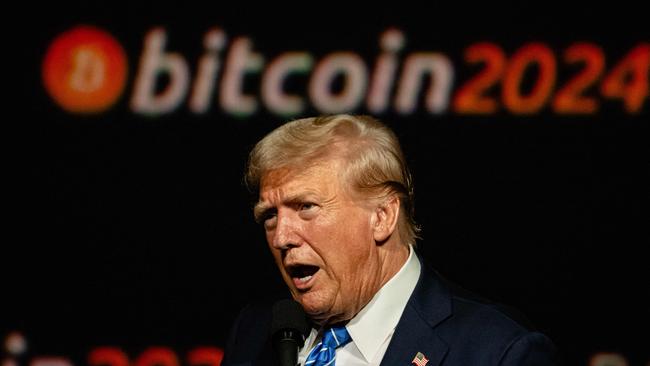Trump to boost crypto, but don’t expect to buy a coffee with bitcoin: Bank of England adviser says
The US president-elect will catapult crypto into the mainstream, but it won’t become a cash replacement yet. Here’s why, according to one of the world’s leading experts on digital currencies.

Donald Trump will catapult digital currencies into the mainstream, after he vowed to become the first “crypto president”, an adviser to the Bank of England says.
Just don’t expect to buy your coffee or lunch with bitcoin soon.
The US has so far been tough on cryptocurrencies, urging Switzerland – long famous for its bank-secrecy laws – to dump Libra, a digital currency proposed by Facebook – five years ago. But Mr Trump appears more pragmatic, declaring at this year’s Bitcoin Conference: “If crypto is going to define the future, I want it to be mined, minted and made in the USA”, vowing to make “bitcoin the superpower of the world”.
He has appointed Elon Musk – one of cyrpto’s biggest backers – to a new role as head of the Department of Government Efficiency, which also shares the same acronym as dogecoin. Presidential transition adviser Howard Lutnick – who Mr Trump nominated to lead the Commerce Department – also advises Giancarlo Devasini, the owner of the cryptocurrency firm Tether.
Digital currencies have soared as a result, with the price of bitcoin soaring above $150,000 for the first time last week.
Etay Katz – a partner at Ashurst’s financial regulation practice and Bank of England adviser – says Mr Trump’s presidential victory was a “tailwind for the digital movement” – and changing sentiment did not require legislative change.
“It takes a change of sentiment at the agencies, and so if you install the right people to chair the agencies, then you can actually see a significant uptick in a favourable environment, pretty fast by US standards,” Mr Katz said.
“To be honest, we’re starting from a low bar because at the moment in the US, setting policy by enforcement. And everyday it changes. It’s the classic sort of us hodgepodge of SEC says one thing and enforces against the world, CFTC says another thing and doesn’t enforce against the world, and then the Fed sits there at the back and kind of every now and then, does a check, a kick at a tire.
“It’s like, OK, kids, just can you, can you stop the screaming and can we focus. So my expectation is of a significant uptick in a favourable environment in the US, which is actually going to have a global impact given how much of a standard setter the US is.”

Mr Katz highlighted Switzerland looking to host Libra as an example. “They saw a delegation pretty quickly coming from Washington DC to tell them something needed to change pretty quick.”
“In this environment where everyone fears US, sanctions, everyone fears US enforcement, if the US changes the sentiment that will have a very fundamental impact on policymaking worldwide and for me, it’s a welcome change, for sure.”
The Reserve Bank of Australia has been more advanced than other central banks in regard to digital currency. It has as started a three-year digital money work plan with the Federal Treasury to look at opportunities to uplift the efficiency, transparency and resilience of wholesale markets through tokenised money and new settlement infrastructure.
Such a currency would be a digital form of money, issued by the RBA, that was accessible to a limited range of wholesale market participants, such as financial institutions and, depending on the design of this form of money, other large institutions.
Mr Katz has been advising the Bank of England to do the same and look at how stablecoin and other digital currencies can enter the mainstream.
“My advice is, you can’t leave a policy void. The market wants to push in a certain way. We have had the emergence of the stablecoins. Circle has massive market share, Tether and to some extent others as well.
“So sitting there, saying you guys have got to play ball is not viable anymore. You’ve got to develop a strategy where if you don’t want the stablecoins to grow, you’ve got to allow something else that is as good as them to come and take their place. That’s why the Bank of England, and in fact every central bank and every regulatory authority in developed countries, has been looking at CBDC (central bank digital currency).
“That movement basically has kind of kicked into place as a defensive move, in reaction to Libra. That motion is going to be accelerated, I expect, because it feels to most people that you know that no matter the debate, intellectual debate about use cases or ‘is it needed, or is not needed’, it will become reality purely because you have to have something to fill the void and to allow a reliable DLT (distributed leger technology) underpinned, settlement asset which is trustworthy, which the States can tolerate.”
But Mr Katz said that did not mean people could suddenly start paying for their coffee with bitcoin and other digital currencies, despite ATMs that allow people to buy crypto appearing across Australian shopping centres.
Not only would that disrupt monetary policy and a central bank’s ability to fight inflation or spur the economy, the currency is just too volatile to replace cash, Mr Katz said.
“Is bitcoin going to be able to fulfil a role as a means of exchange as a money substitute? It’s it hasn’t done that so far. And I think the reason why it hasn’t done that is a) volatility because in order to be a successful so-called currency, you need to be within certain bounds of volatility. That’s a fundamental feature of an effective means of exchange, because if I buy bitcoin, and then it fluctuates 70 per cent tomorrow, then it’s an investment thing or a commodity, but it’s not a means of exchange.
“And then also, how far will the authorities allow the traditional market infrastructure to interact with bitcoin coming in and going out, such that it can be an effective sort of, ‘I go to get my coffee, and I’m paying in bitcoin’. And so far, I think that the word by the authorities to the big, significant players – including, by the way, people like Amazon – is don’t accept bitcoin into your platform, because we think it is disruptive to the way in which we want to run the monetary policy.”




To join the conversation, please log in. Don't have an account? Register
Join the conversation, you are commenting as Logout